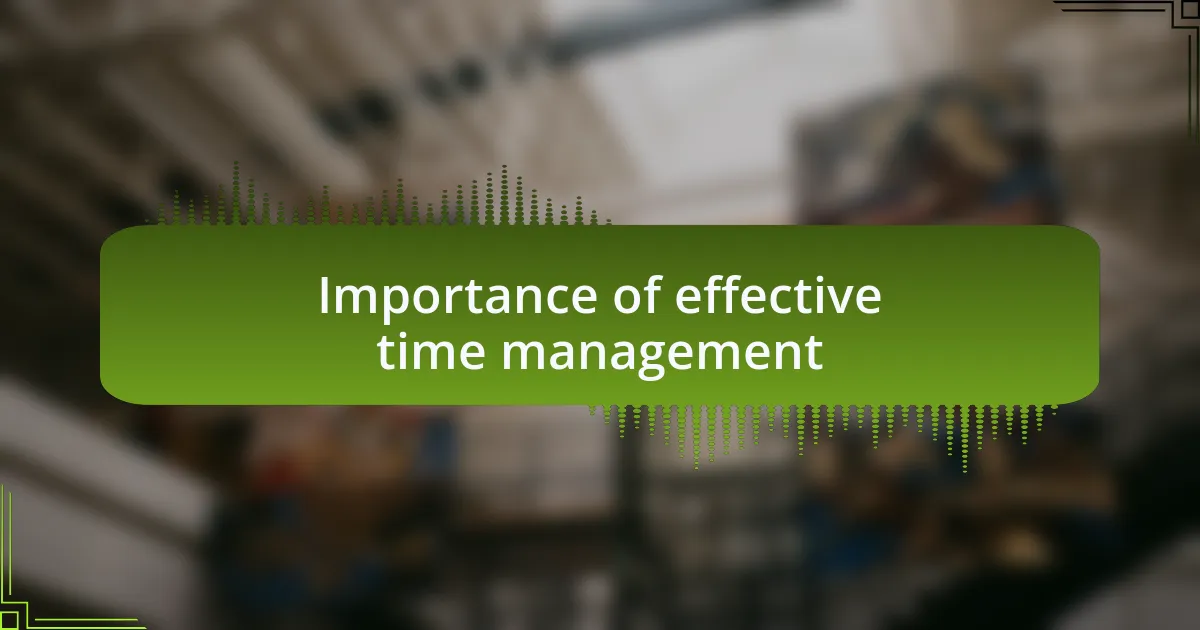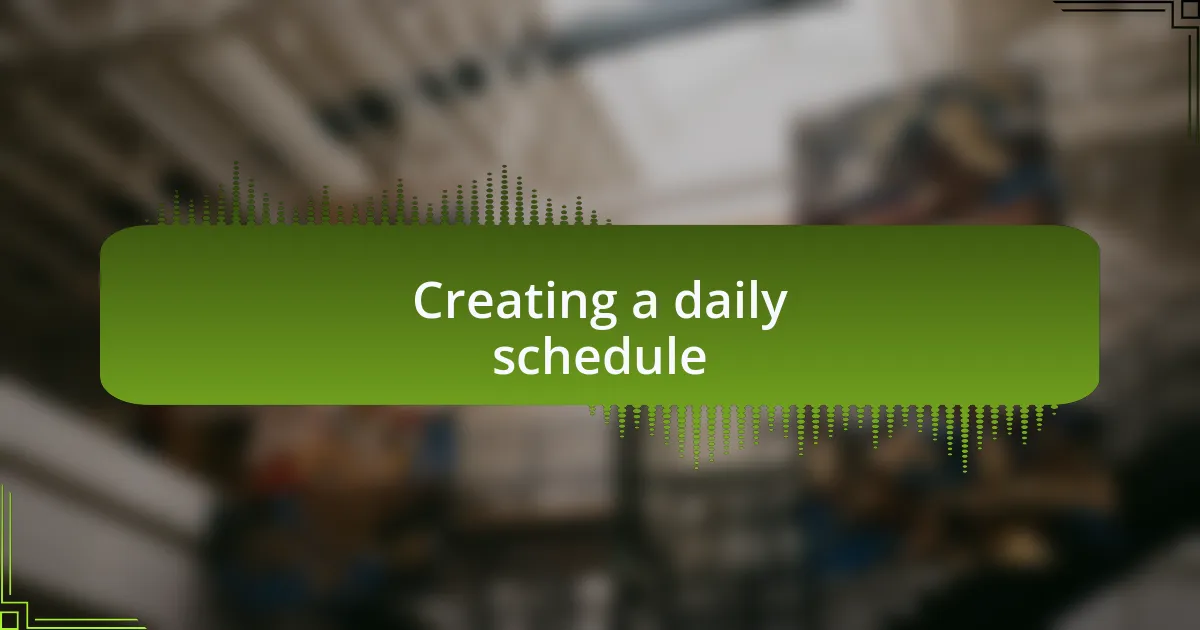Key takeaways:
- Effective time management involves prioritizing tasks using tools like the Eisenhower Matrix and techniques like time blocking and the Pomodoro Technique.
- Setting realistic goals and regularly evaluating time usage helps maintain motivation and aligns daily activities with long-term aspirations.
- Creating a structured daily schedule enhances productivity by allocating specific time blocks for tasks while allowing flexibility for unexpected interruptions.
- Personal accountability and seeking feedback from others can uncover blind spots in time management practices, enriching one’s approach to productivity.

Understanding time management concepts
Time management is more than just creating a to-do list or marking items off a calendar; it’s about understanding how we value our time and what activities truly matter. I remember a time at a busy audiovisual expo where I juggled multiple tasks and felt overwhelmed. That experience taught me that prioritizing tasks is essential. This is where the Eisenhower Matrix comes into play—differentiating between what’s urgent and what’s important can truly reshape how we approach our daily schedules.
When I first started diving deep into time management, the concept of “time blocking” fascinated me. By allocating specific chunks of my day to focused work and breaks, I found that my productivity surged. Have you ever noticed how a simple change in routine can lead to profound results? It’s refreshing to discover that small adjustments, like knowing when to step away for a breather, can make a world of difference.
Additionally, it’s crucial to be aware of our internal and external distractions. I often found myself scrolling through social media when I meant to focus on a project. Recognizing those triggers and setting boundaries helped me reclaim precious minutes. Have you experienced similar challenges? Understanding these dynamics within your own habits can empower you to take back control of your time, setting you up for success in both your personal and professional endeavors.

Importance of effective time management
Effective time management is crucial because it directly influences our productivity and overall satisfaction. I recall a particularly hectic period during an audiovisual convention where I underestimated the time required for setup. By failing to manage my schedule effectively, I ended up scrambling at the last minute, which not only heightened my stress but also impacted the quality of my presentations. Isn’t it interesting how a few missteps in our planning can ripple through our entire day?
When I prioritize my tasks intelligently, I often find that my stress levels drop significantly. It’s almost like discovering a hidden treasure when I realize that by focusing on what truly matters, opportunities for creativity and innovation emerge. Have you experienced that spark of inspiration when you’ve given yourself the space to think? It’s undeniably rewarding to witness how effective time management can open doors to new possibilities.
Moreover, understanding the importance of setting realistic goals has also shaped my approach. Early on, I set myself up for disappointment by aiming too high without assessing my time realistically. This took a toll on my motivation. Now, I focus on small, achievable milestones that feed into larger goals. It’s a game changer, really. I invite you to consider your own goal-setting process. Are you allowing space for flexibility and adjustments as you work to achieve your dreams?

Common time management techniques
One widely recognized technique is the Pomodoro Technique, which involves working in focused bursts of 25 minutes followed by short breaks. I remember adopting this method during preparation for a major presentation at an expo. The structured intervals not only kept my energy levels high but also enhanced my concentration. Isn’t it refreshing to discover that taking regular breaks can actually improve productivity rather than hinder it?
Another effective strategy is the Eisenhower Matrix, which helps prioritize tasks based on their urgency and importance. When I first stumbled upon this method, I was amazed by how categorizing my tasks could illuminate what truly required my attention. By focusing on what was important rather than merely urgent, I could allocate my time wisely and significantly reduce the clutter in my schedule. Have you ever found yourself drowning in tasks that seemed urgent but held little real value?
Time blocking is yet another technique I’ve found beneficial, where you dedicate specific blocks of time to particular tasks or projects. By visually mapping out my day, I learned to allocate time not just for work, but also for rest and reflection. It struck me how easily we can underestimate the importance of downtime in fostering creativity. Have you ever considered how a well-planned day could lead to a more fulfilling work-life balance?

Setting realistic goals and priorities
Setting realistic goals is a crucial first step in effective time management. I’ve often rushed into a new project, only to realize later that I set my expectations too high. It’s frustrating! Now, I take a step back to assess what I can realistically achieve within a given timeframe. This not only clarifies my priorities but also helps me stay motivated since I can celebrate small successes along the way.
When it comes to prioritizing tasks, I’ve discovered the importance of distinguishing between what truly matters and what can wait. There was a time I was overwhelmed by a never-ending to-do list, only to find that some tasks were pressing but lacked significance. Using methods like rating each task on a scale of 1 to 5 has transformed my approach. By giving myself permission to focus on high-impact activities, I feel a weight lifted off my shoulders. Have you ever felt like you were spinning your wheels, working hard without making progress?
In my experience, balancing short-term objectives with long-term aspirations has greatly enhanced my time management journey. I often reflect on my goals every month, adjusting them based on what and how much I can handle. This flexibly allows me to adapt to unforeseen challenges while keeping me aligned with my broader vision. I wonder if others feel the same pressure to constantly reassess their goals? It’s a helpful reminder that time management isn’t a one-size-fits-all approach; each of us must find a rhythm that resonates with our personal and professional lives.

Creating a daily schedule
Creating a daily schedule serves as the backbone of effective time management for me. I remember a time when I simply jotted down tasks in my notebook without much thought, resulting in chaos. Now, I dedicate a few minutes each morning to craft a structured plan, which has significantly boosted my productivity. The sense of accomplishment I feel when I tick off completed tasks is genuinely satisfying.
I find it helpful to break my day into blocks of time, assigning each task a specific slot. During those early days, I often overestimated what I could achieve in an hour, leading to frustration. By evaluating my energy levels and focusing on one or two tasks at a time, I’ve learned to make the most of my efforts. Have you ever noticed how certain times of the day feel more productive? Identifying your peak hours can be transformative.
Lastly, I like to incorporate flexibility into my schedule. Life can be unpredictable, and I’ve had my fair share of interruptions. By allowing squeezed spaces for unexpected tasks or even some downtime, I maintain a sense of control without the stress of rigid timelines. Isn’t it amazing how a small adjustment can lead to a more balanced day? A well-crafted daily schedule not only organizes my tasks but also fosters a sense of peace amidst the busyness of life.

Evaluating your time management
Evaluating my time management is a crucial step for me, and I approach it with a sense of honesty. I recall a period when I felt constantly busy yet unproductive. After reflecting on my week, I realized I was spending too much time on tasks that didn’t truly matter to my goals. This revelation pushed me to regularly review my priorities, ensuring they align with my long-term aspirations.
One effective way I’ve found to evaluate my time usage is by keeping a time log. For a week, I noted down how I spent each hour, which revealed some surprising patterns. I often found hours eaten up by distractions that seemed minor at the time. Asking myself, “Is this truly benefiting my objectives?” helped me reclaim lost time and redirect my focus towards more important activities.
Additionally, I’ve learned to seek feedback from others about my time management habits. Conversations with colleagues or friends have brought insights I might have overlooked. Sometimes, an outside perspective can highlight areas for improvement that I hadn’t considered. How often do we miss what’s right in front of us? Engaging with others has not only enriched my understanding but also fostered accountability in my time management journey.

Personal time management tips
One of the personal time management tips that has transformed my routine is the practice of setting boundaries. I vividly remember a time when my calendar was crammed with meetings that seemed essential but drained my energy without delivering results. By designating specific hours for focused work and communication, I found that I not only got more done but also felt a renewed sense of control over my day. Have you ever felt overwhelmed by others’ demands on your time? I certainly have, and it’s liberating to reclaim those precious hours.
Another strategy that resonates with me is the Pomodoro Technique, where I break my work into focused intervals, often lasting 25 minutes, followed by short breaks. I was skeptical at first, but after giving it an honest shot, I noticed how those brief pauses revitalized my concentration and creativity. Is there a task that tends to feel more daunting than it should? Dividing it into manageable chunks can make a significant difference, turning a mountain of work into a series of small, achievable tasks.
Additionally, I’ve found that prioritizing tasks according to urgency and importance can lead to a more efficient workflow. Reflecting on past projects, I remember how I would often tackle low-priority tasks first, only to scramble later for deadlines. Now, I employ a simple ‘Eisenhower Matrix’ to categorize my to-do list, which helps me focus on what truly matters each day. How often do we let trivial matters consume our energy while the bigger, impactful tasks linger? Adopting this approach has fundamentally shifted my perception of productivity, making each day feel purposeful.